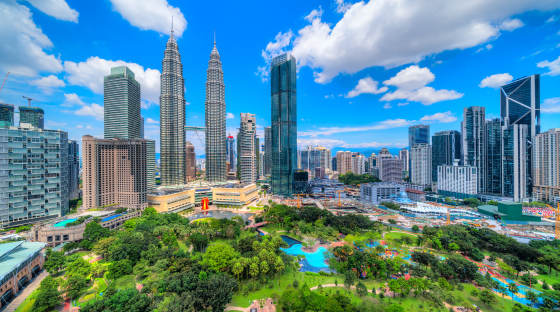Malaysia

Overview
A talent shortage in mid-level and senior positions is the greatest challenge facing Malaysia’s digital economy, forecast to contribute 25.5% to GDP by 2025. Skills in cybersecurity, agile and scrum, and big data and AI are in the most demand. At the heart of the government’s strategy is the Malaysia Digital Economy Corporation, which aims to make the country a regional leader in inclusive, responsible, and sustainable socio-economic development through digitalization.
Climate change poses a significant risk for Malaysia, which is among several nations forecast to experience economic growth 20% below expectations by 2050 if global temperatures increase by 2°C. Development of Malaysia’s digital economy is expected to play an important role in addressing climate change, with tech solutions pitched to have the potential to reduce greenhouse gas emissions by up to 15% by 2030. Further development of digital agriculture and sustainable farming has also been targeted to boost food security.
With its low crime rate and comfortable cost of living, Malaysia is the most popular place in Southeast Asia for expats to retire. A secular country with a majority Muslim population, Malaysia was first colonized by the Portuguese in the 15th century, then the Dutch and the British until achieving independence in the 1950s. English remains widely spoken today.
The Accelerance Global Network is the most curated list of high-quality global teams ever assembled.
18hrs
Time Travel (From NY)
Average flight time from NY to the major cities in the country.
69
Partner Innovation capability
The score reflects investment in STEM progrms and IT funding by country.
59
Partner Skill Level
Level of workforce skills and quality of education, including factors such as digital literacy, interpersonal skills, etc.
56
Partner Global Competitiveness
National productivity based on 12 core pillars, including government policy, infrastructure, economic stability, etc.
Low
Software Outsourcing Readiness
Overall rating, based on the maturity of the tech sector, socio-political conditions, and on-the-ground research by Accelerance.

Talent Pool & Education
Demand for technology talent largely outstrips supply in Malaysia, leading to increased competition for talent, according to Randstad’s 2024 Job Market and Salary Guide for Malaysia. As a result, the government has expanded support for developing the sector in its 2024 budget, including funding for cybersecurity and a plan to increase investment in e-sports. The private University of Wollongong Malaysia now has a bachelor’s degree in game development, and virtual production company 3Particle Solution Sdn Bhda has partnered with the Asia Pacific University of Technology & Innovation to create talent development programs.
In collaboration with Microsoft, the government has also launched a nationwide Talent in Tech Accelerator Program that aims to equip 1,000 final-year students from public universities with in-demand technical skills and certification. The initiative aligns with the Higher Education Strategic Digitalization Plan, which includes a focus on strengthening digital competency through training and enhancing skills to foster a digital-centric culture. Most recent figures show Microsoft on target to achieve its goal of developing “cloud-ready talent” to one million Malaysians through its aligned Bersama Malaysia (Together with Malaysia) project.
Also upskilling the sector is Technology Park Malaysia, a 700-acre science park based in Kuala Lumpur that is home to more than 150 technology companies and includes an Innovation Incubation Centre to support “technopreneurs” in the renewable energy, information and communications technology, biotech and engineering industries.
Language
The official language is Malay but English is taught in schools and fluency levels are high. Roughly 80% of urban businesses in Malaysia conduct their transactions in English. All major tourist spots and attractions are well labeled in English and most restaurants have an English menu.

Economic Outlook
The IMF is forecasting continued growth after the economy rebounded to pre-pandemic levels, and puts Malaysia on track to achieve high-income status in 2024. The country has one of the highest standards of living in Southeast Asia. Less than 1% of Malaysian households live in extreme poverty and the country’s low unemployment rate is expected to stabilize at 4.2%, although youth unemployment is more than triple the national level.
The government is expected to use the Madani Economy 10-year masterplan to restructure the economy, improve living standards, and guide major policy moves. Inflation will face strong upside pressures, according to the Economist Intelligence Report, with austerity measures such as tax increases and a cut in fuel subsidies suppressing private consumption. Geopolitical risks include the ongoing conflict in Ukraine and the Middle East, and trade tensions between the US and China, one of Malaysia’s top trading partners. However, Malaysia's established electronics parts and components industry may benefit from foreign investors in the sector looking to shore up their supply chain by expanding existing facilities.
Political Conditions
Malaysia's Sultan Ibrahim was installed as Malaysia’s 17th king in early 2024. While the monarchy largely plays a ceremonial role, its influence has grown in recent years, with the king’s predecessor employing rarely used discretionary powers to quell political instability. Known for his large collection of luxury cars and motorbikes, Ibrahim has wide-ranging business interests from real estate to mining. Before his inauguration, he told Singapore's The Straits Times newspaper he intended to be an active monarch and proposed that Malaysia's state oil firm Petroliam Nasional and the country's anti-corruption agency report directly to the king – statements later downplayed by Prime Minister Anwar Ibrahim.
Malaysia has seen ongoing political turmoil since 2018 when the then-ruling Barisan Nasional coalition was ousted from power for the first time since independence. The Pakatan Harapan now leads a unity government that includes several smaller political parties and the Economist Intelligence Unit believes a stability pact signed in 2022 will hold. The next general election is not due to be held until 2028.
Learn more about our customer stories.
Looking for a customer story in a specific technology or industry? Discover compelling customer narratives within a specific technology or industry that resonate with your unique software development needs.


.png?width=300&name=Copy%20of%20WEBSITE%20Stop%20Chasing%20Low%20Hourly%20Rates%20Unlock%20the%20True%20Value%20of%20Offshore%20Development%20(450%20x%20253%20px).png)



